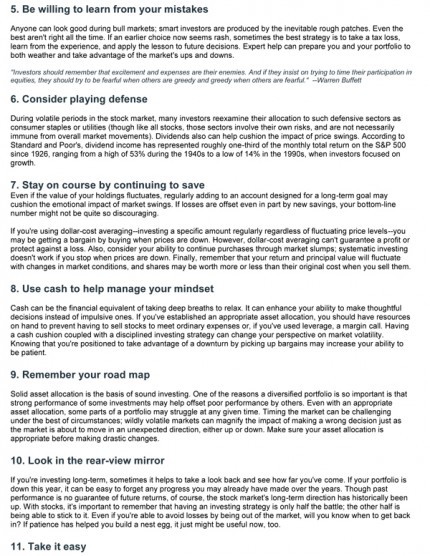5 Ways to stay sane in a crazy market
Post on: 25 Май, 2015 No Comment

5 ways to stay sane in a crazy market
After the solid, record-breaking market performances of 2013, it’s difficult to stomach the market turmoil we’ve seen so far in 2014 – despite the fact that it is quite normal for stocks to encounter volatility. We all know rationally that ‘past performance is not indicative of future results’, but thanks to our intrinsic behavioral biases as human beings, when things are going well, we still emotionally expect (and hope) that the good news will continue. We forget that, markets being markets, and volatility being a known component of the investment universe, there will be troughs that follow the peaks.
When our emotions get the best of us, its useful to have strategies in place that can help us both financially and psychologically in dealing with the inevitability of market volatility. Following are some techniques that can help in preventing us from making hasty short-term decisions that could have long-term repercussions regarding our ability to achieve our financial goals.
1. Have an investment strategy
Having predetermined guidelines that acknowledge and accommodate the potential for turbulent times can help prevent emotion from dictating your decisions. Understanding your level of tolerance for market risk and volatility is paramount to your success as a prudent, long-term investor. Your investment strategy, and resulting portfolio design, must be aligned with your comfort level for market risk, your investment objectives, and your time horizon.
2. Focus on the forest, not the trees
As the market fluctuates, it’s easy to fixate on day-to-day returns. A more constructive (and sanity-saving) approach is focus on your long-term investment goals – outlined in your investment strategy – as well as your overall portfolio performance. While only you know your level of investment risk tolerance, if you still have years to invest, don’t over-estimate the effect of short-term price fluctuations on your long-term portfolio strategy.
3. Remember volatility comes with the territory
The financial markets are historically cyclical. If youre considering portfolio adjustments, based on a change in your time horizon, risk tolerance, or financial circumstance, remember that a volatile market is usually an extremely inopportune time to reconstruct your portfolio. A well-thought-out asset allocation approach is still the foundational tenet of good investment planning.

4. Continue to save
Even if the value of your holdings fluctuates, regularly adding to an account designed for a long-term goal may cushion the emotional impact of market swings. If losses are offset (even in part) by new savings, you might discover that your bottom line is, in fact, encouraging.
5. Look in the rear-view mirror
If youre investing long-term, sometimes it helps to take a look back and see how far youve come. Though past performance is no guarantee of future returns, the stock markets long-term direction has historically been up. With stocks, its important to remember that having an investing strategy is only half the battle; the other half is being able to stick to it. If patience has helped you build a nest egg, it just might be useful now, too.
Source: Broadridge/Forefield.














